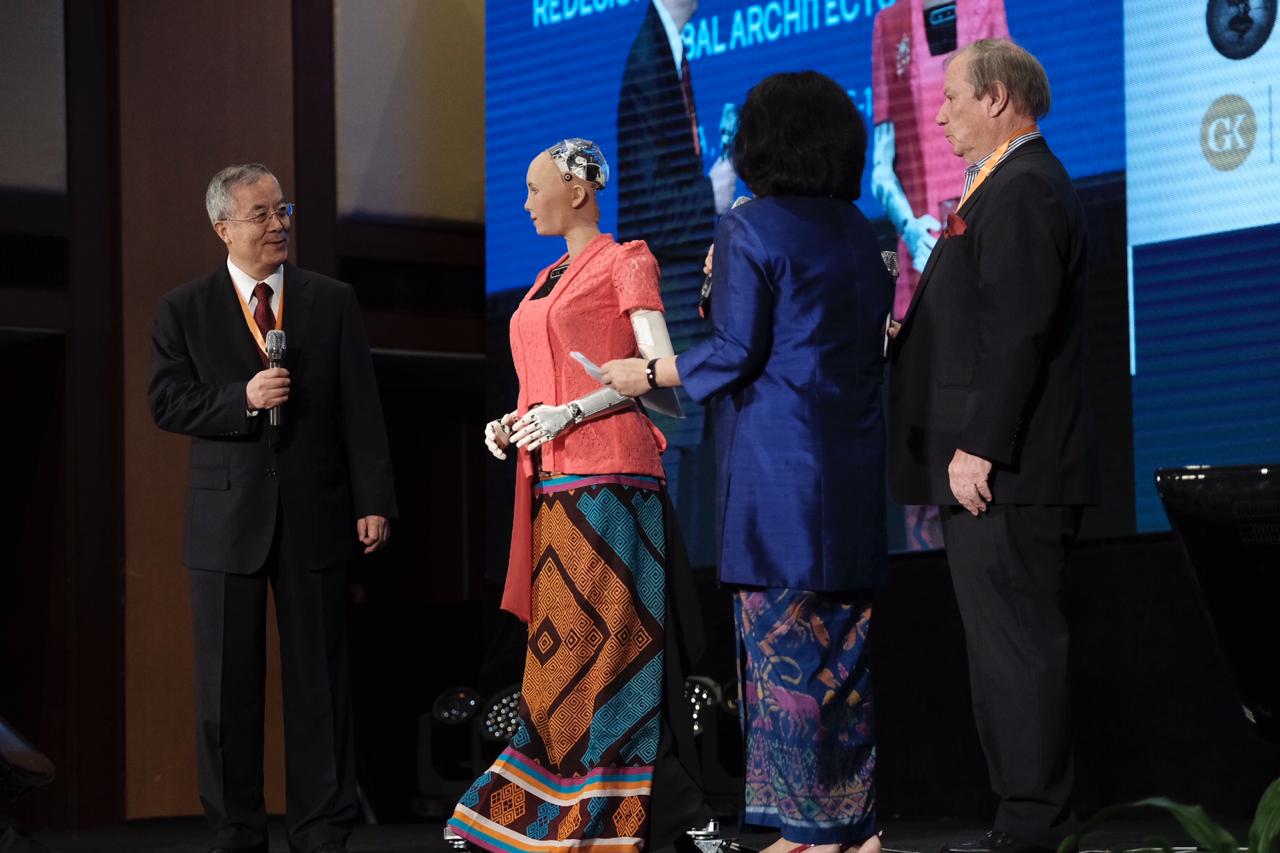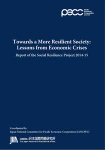|

The Pacific Economic Cooperation Council (PECC) and the Centre for Strategic and International Studies (CSIS) co-organized the 2019 CSIS Global Dialogue in collaboration with the University of Prasetiya Mulya and GK Plug and Play Indonesia on Harness Frontier Technologies: Redesigning National, Regional and Global Architecture on 16-17 September 2019. H.E. Sri Mulyani Indrawati, Minister of Finance said that “if technological progress is used in a proper way, we are going to be able to have much higher productivity, value-added, efficiency and also reduce waste”.
The meeting took place against the backdrop of rising concerns on the rapid advancement of technology and how it will affect the global economy in terms of globalization, cyber security and future skills workforce. Participants engaged in a first-hand discussion with Sophia – a human-like robot modelled after actress Audrey Hepburn.
The discussions were organized into four plenary sessions:
- Plenary Session 1: The New Technology Frontier in Big Picture
- Plenary Session 2: Deep Economic Impacts of the Technology Revolution
- Plenary Session 3: Security and Ethics in the Cyber Society
- Plenary Session 4: Wrap up and Way Forward
In addition to the plenary discussions, stakeholders discussed several issues and recommendations during in-depth breakout sessions on:
- The Intelligent Economy: Preparing for the Transition: Education and Reskilling
- Trade and Investment Issues in the Digital Era: Regional and Plurilateral Initiatives: ASEAN, RCEP, TPP, APEC, Belt and Road Initiative: Common Denominators of Connected Intelligent Regions
- Taxing the Intelligent Economy Cooperatively, Inclusively and Sustainably
Minister Sri Mulyani engaged in a dialogue with the rapporterus from the breakout sessions hearing the summary of the views of those who had participated in those in-depth discussions.
Regional economies need to prepare and enhance governance to ensure that they can benefit from technology advancement. There are still grey areas that need to be addressed, such as job security, data protection and ethics. For example, while taxing robots might be one way to bolster government revenues given the need to help displaced workers but in turn there are risks of harming innovations.
There are urgent questions that need to be addressed in a cooperative manner both within societies and internationally on not only what technology can do, but what it should and should not do. One step that should be considered to enhance the free flow of data is for governments, companies, and societies to develop common definitions of security, privacy, and trust.
UPCOMING EVENTS
The seminar will explore the framework for the development of the digital economy and the conditions under which all economies will benefit or could be affected by its development.
The seminar will also address steps to reduce the cost of doing business to and from the Asia-Pacific region. With more traditional barriers to trade now greatly reduced, attention will focus on how to deal with the existence of NTMs and behind the border measures; what are the perceived/estimated cost of NTMs for doing business in the Asia Pacific Region, are NTMs likely to materially affect trade to and from the region even if some NTMs are legitimate and not intended as protectionism?.
This seminar will take into account the diversity and complexity of NTM’s, the extent to which they are embedded in regulations which may serve legitimate purposes, and the extent to which differences in social and economic priorities may limit the scope for convergence in regulations across economies. It will focus particularly on the challenges faced by MSMEs in confronting high costs of trade imposed by NTMs.
The concluding seminar on Asia-Pacific strategies for the global trading system will be jointly organized with NZPECC in Auckland, New Zealand in April 2020.
As a follow up to the series of seminars on “Circular Economy and Economic Development ” led by the French (Pacific Territories) committee for PECC (FPTPEC) which has consisted of a series of three seminars during the 2017-2018 period 1) the natural resources industries; 2) the tourism industry; and 3) mutual recognition of rules and standards to facilitate trade and foreign direct investment, FPTPEC is pleased to forward to the PECC community the preliminary program for the seminar entitled “ Resilient islands and territories in the Asia-Pacific” to be held on December 2/4 2019, in Papeete, French Polynesia.
Committees of the PECC economies are invited to submit papers for domestic or regional projects they would like to present on that occasion.
The present project will examine, explore and elucidate if a circular economic approach to protect islands and coastal territories from sea water rise and climate change may help islands and territories across the Asia-Pacific Region to be more resilient and can help to support sustainable economic growth. The seminar will also address how tourism can be better managed and it can bring a positive contribution to local economic growth
The following issues will be addressed:
- How to better protect coastal areas from erosion and sea rise
- What can of housing projects should be selected
- How to bring assistance to population and settlements in remote islands in the Asia-Pacific area
The project will also examine how to propose a better management of tourism activities in islands and inlands areas in order to protect their territories from activities which may create environmental damages to protected and /or sensitive areas .
Selected case studies from PECC members economies will be presented as potential paths towards a more sustainable economic growth and environmental protection in islands in the Asia-Pacific.
Contributions to the seminar by PECC members economies are most welcome.
PUBLICATIONS
 A series of regional and global financial crises highlighted the need to enhance the resilience of social infrastructure against sudden shocks, particularly for those categorized as vulnerable groups. More recently, a persistent and widening social divide that casts a shadow on the stability of national and global systems presents a serious challenge, and more social policies need to be developed to mitigate this gap. A series of regional and global financial crises highlighted the need to enhance the resilience of social infrastructure against sudden shocks, particularly for those categorized as vulnerable groups. More recently, a persistent and widening social divide that casts a shadow on the stability of national and global systems presents a serious challenge, and more social policies need to be developed to mitigate this gap.
In response to these challenges within the Asia-Pacific regional context, the Japan National Committee for Pacific Economic Cooperation (JANCPEC) has been conducting the Social Resilience Research Project (SR Project) as a Pacific Economic Cooperation Council (PECC) International Project since 2010. The SR Project aims to shed light on the importance of social security and to closely examine its role in the domestic economy. In addition, the SR Project is the first ambitious attempt by the APEC/PECC family to discuss social policy dimensions, as APEC and PECC have traditionally focused on trade and investment liberalization issues.
The first and second SR Projects have a four-fold focus: pensions, health insurance, unemployment insurance, and macro-analysis. The first final report, entitled “Towards a More Resilient Society: Lessons from Economic Crises,” was published in October 2010, and the second final report was published in March 2012. Since 2012, we have attempted to conduct a case study of each Asia-Pacific economy. As the economic and social circumstances in each economy of this region are significantly different, a bottom-up approach is needed to identify the issues and challenges for the future development and reform of social security systems.
In this report, the SR Project 2015-2017 covers Singapore and Indonesia. The studies focus on specific issues in these economies, such as coverage for informal workers and the evolution of social security systems in an age of slow economic growth.
Report of the Social Resilience Project 2015-2017
|



